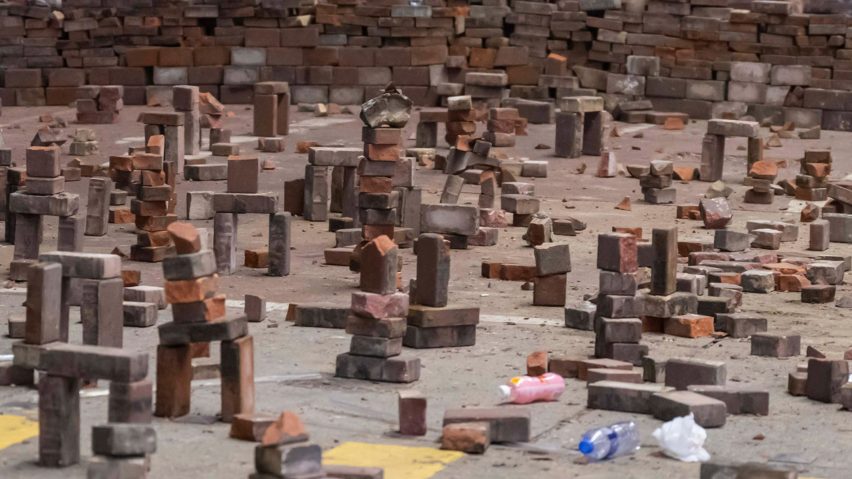In this week's comments update, readers are debating the winner of the People's Choice category at the Designs of the Year awards and sharing their views on other top stories.
This year's winner of the People's Choice category at the Designs of the Year awards is Brick Arches – makeshift roadblocks from Hong Kong's pro-democracy protests.
The roadblocks are ordinary bricks stacked ankle-high in clusters of three, set up on roads to stop vehicles moving forward.
When struck by a wheel, the top brick falls away and the remaining two bricks form a buttress that prevents the wheel from moving.
According to Design Museum curator Maria McLintock, the design won because the roadblocks could be made by anyone anywhere.
"It is one thing peacefully protesting, but another actively destroying the city"
Readers are divided. "This is horrible," said Sam Jian. "The bricks are from the public roadway, public property used by everyone. These rioters are destroying public property. It is one thing peacefully protesting, but another actively destroying the city."
Heywood Floyd continued: "The ability for protestors to build their own roadblocks can only be praised when the protestors' political ideologies are in alignment with those of the people issuing the praise. Once the common interests diverge, all you are left with is domestic terrorism. Imagine the insurrectionists at the US Capitol using this concept. Slippery slope..."
"How is placing bricks in the street terrorism?" replied Steve. "An armed, violent unreasoning mob breaking into your workplace is domestic terrorism. If the insurrectionists had just placed bricks in the street, it would have been an inconvenience for some, but I don't think anyone would have been too terrorised."
Hello Peril agreed: "Losing the right to vote, violations of the integrity of the legal system and Supreme Court, violations of human rights and living under a suppressive dictatorship is why the brave people of Hong Kong are rebelling against the system. But don't worry about all that, you worry about those poor little old bricks on the road."
What do you think of the project? Join the discussion ›
"I pray it works" says reader
Commenters are debating Studio Roosegaarde's proposal for a light that uses ultraviolet radiation to sanitise outdoor spaces. The project aims to reduce the risk of people contracting Covid-19.
"Extraordinary," said Toni Callas. "I pray it works."
Olivier Van Den Hoven was less sure: "Perhaps I'm not smart enough, but the way I see it a contagious person can still easily contaminate his or her neighbour when he or she steps into the sanitised cone and utters a loud 'hello'. What am I missing here?"
Cassandra Many from Studio Roosegaarde responded in the comments section: "Urban Sun is not a cure for the virus, nor should it be considered a replacement for safety precautions in place as established by local governments. It is meant to be an additional layer of safety, and an exploration of what is possible if we look for solutions within both science and design."
Are you impressed by Urban Sun? Join the discussion ›
"The concept is admirable, but why call it a forest?" asks commenter
Readers are discussing Es Devlin's plans to fill the entire courtyard of Somerset House in London with 400 trees this summer. The installation is part of the city's Design Biennale.
"The concept is admirable, but why call it a forest?" asked Jeff Harpell. "In nature that's plants, animals, microbes and interrelated processes – a marvellous ecosystem. A bunch of potted trees does not a forest make."
Alfred Hitchcock agreed: "These trees certainly won't be 'planted' in this grade I listed paved courtyard. They will be in pots. Do 400 trees really constitute a "forest"? There's more trees than that in the adjacent Victoria Embankment Gardens."
"'The Forest for Change' sounds a bit better than 'Trees in Pots for Change'", replied Chris Becket. "For all of you who are so literal-minded, this installation is representing – figuratively – the planting of forests around the world. There is no direct claim of this actually being a forest."
Are you inspired by The Forest for Change? Join the discussion ›
"Wow, that is just wonderful" says reader
Commenters are critiquing a house in Austria, which Firm Architekten built using timber from the client's own forest and materials sourced within 50km.

